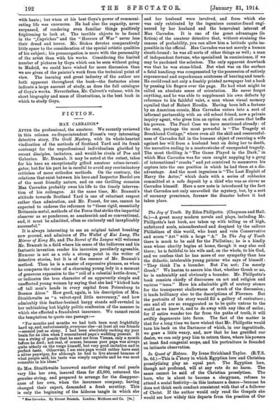FICTION.
MAX CARRADOS.•
AFTER the professional, the amateur. We recently reviewed in this column ex-Superintendent Froest's very interesting detective story, The Oral Mystery, with its whole-hearted
vindication of the methods of Scotland Yard and its frank contempt for the unprofessional individualism glorified by recent disciples, imitators, and would-be rivals of Poe and Gaboriau. Mr. Bramah, it may be noted at the outset, takes for his hero an exceptionally gifted amateur crime-investi- gator, but for his part be is careful to avoid any recriminatory criticism of more orthodox methods. On the contrary, the relations that exist between his hero and Inspector Beedel are of the most friendly nature, and on one thrilling occasion Max Carrados probably owes his life to the timely interven- tion of his colleague. At the same time, Mr. Bramah's attitude towards Scotland Yard is one of reluctant respect rather than admiration, and Mr. Froest, for one, cannot be expected to endorse the reference to "those rigid, essentially Britannia-metal, methods of the Force that strike the impartial observer as so ponderous, so amateurish and so conventional, and, it must be admitted, often so curiously and inexplicably successful."
It is always interesting to see an original talent breaking new ground, and admirers of The Wallet of Kai Lung, The Mirror of Kong Ho, and The Secret of the League will welcome Mr. Bramah in a field where his sense of the ludicrous and his fantastic invention render his incursion peculiarly agreeable. Humour is not as a rule a strong point in the writer of detective stories, but it is of the essence of Mr. Bramah's method. Then he is a master of expressive phrases, as when he compares the voice of a charming young lady in a moment of generous expansion to the "roll of a celestial kettle-drum," or indicates the true character of an apparently simple and unaffected young woman by saying that she had "kicked hats off tall men's heads in every capital from Petersburg to Buenos Aires." How good, again, is hie description of Mrs. Straithwaite as "a velvet-eyed little mercenary," and how admirably this feather-brained harpy stands self-revealed in her unblushing but highly politic confession of the manner in which she effected a fraudulent insurance. We cannot resist the temptation to quote one passage :—
"For months and months we had both been most frightfully hard up, and, unfortunately, everyone else—at least all our friends —seemed just as stony. I had been absolutely racking my poor brain for an idea when I remembered papa's wedding present. It was a string of pearls that he sent me from Vienna, only a month before he died; not real, of course, because poor papa was always quite utterly on the verge himself, but very good imitation and in perfect taste. Otherwise, I am sure papa would rather have sent a silver penwiper, for although he had to live abroad because of what people said, his taste was simply exquisite and he was most romantic in his ideas."
So Mrs. Straithwaite borrowed another string of real pearls very like her own, insured them for £5,000, returned the genuine string, and prepared to arrange for the disappear- ance of her own, when the insurance company, having changed their expert, demanded a fresh scrutiny. This is only the beginning of the hideous tangle in which she
• Mss Corrado,, By Ernest Bremsb. London: Methuen and Co. [es.] and her husband were involved, and from which she was only extricated by the ingenious counter-fraud engi- neered by her husband and the benevolent interest of Max Carrados. It is one of the great advantages (in fiction) of the amateur detective that, without straining the canons of probability, you can allow him a latitude quite im- possible in the official. Max Carrados was not merely a human sleuth-hound he was all sorts of other things as well ; a man of independent fortune, who specialized in omniscience, if we may be pardoned the solecism. The only apparent drawback was that he was stone-blind. But what was on the surface a fatal handicap was compensated by the possession of entirely suprationnal and superhuman acuteness of bearing and touch. He could read not only a freshly printed newspaper but a book by passing his fingers over the page. He had what might be called an absolute sense of orientation. He never forgot anything, and he was able to supplement his own defects by reference to his faithful valet, a man whose visual memory equalled that of Robert Houdin. Having been left a fortune by an American cousin, Max Carrados enters into a sort of informal partnership with an old school friend, now a private inquiry agent, who gives him an option on all cases that baffle his powers. The Pearl Case we have mentioned already: of the rest, perhaps the most powerful is " The Tragedy at Brookbend Cottage," where even all the skill and resourceful. ness of Carrados fail in the humane object of rescuing a wife against her will from a husband bent on doing her to death, the narrative ending in a masterstroke of unexpected tragedy. The moat thrilling is "The Game Played in the Dark," in which Max Carrados was for once caught napping by a gang of international " crooks " and yet contrived to manmuvre his captors into the one position in which he had them at a dis- advantage. And the most ingenious is "The Last Exploit of Harry the Actor," which deals with a series of robberies committed at a safe deposit by a thief who was as clever as Carrados himself. Here a new note is introduced by the fact that Carrados not only unravelled the mystery, but, by a sort of uncanny prescience, forearm the disaster before it had taken place.


























































 Previous page
Previous page